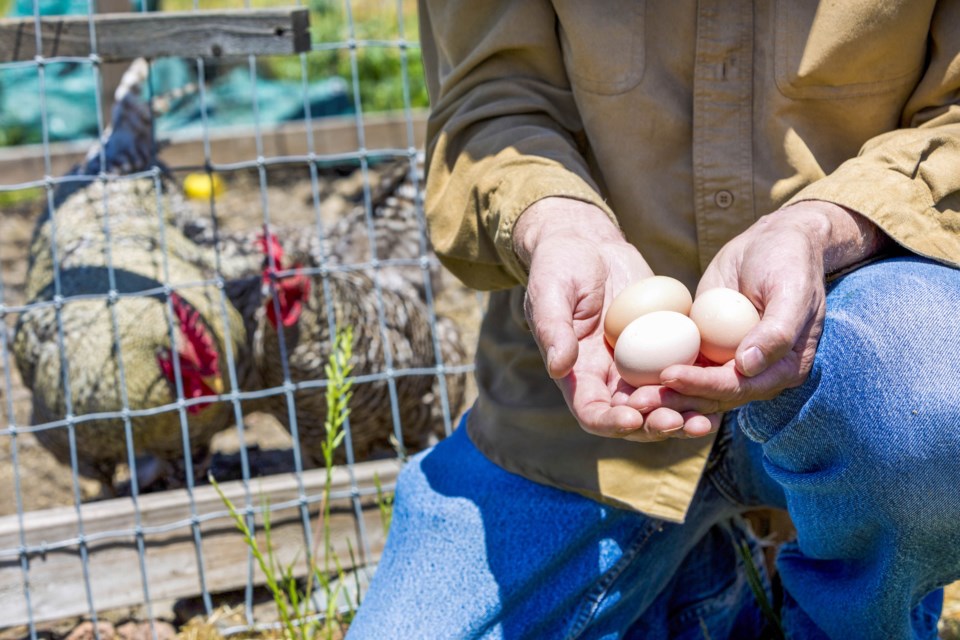SUNDRE — The municipality is now accepting feedback in the form of questions or concerns from residents with regards to the proposed pilot urban hen program.
The deadline to submit input by email at [email protected] is this Friday, Oct. 8. A self-serve virtual open house presenting the proposed bylaw for the pilot program was posted to the municipality’s website on Tuesday, Sept. 28, providing a window of less than two weeks to respond.
Asked whether that was considered enough time to adequately provide an opportunity for residents to digest the document and conjure up any comments and questions they might have in mind, Linda Nelson, chief administrative officer, said on Friday, Oct. 1, “If people are really interested and want to do the research, I don’t know that it really takes that much time.”
The nine-page draft bylaw is simple to find, Nelson said, adding many other municipalities are also in the process of looking at adopting backyard hen bylaws.
“And they’re starting out with doing the bylaws as a pilot project,” she said.
Residents will still get a chance to offer input during the course of the trial, which will give further opportunity to flesh out concerns or matters that either the municipality or the public might not have immediately thought about, she added.
“Doing it through a pilot still gives you that opportunity for feedback," she said.
Also available to download on the town’s website is a consent form for adjacent landowners as well as a backyard chicken pilot program application form.
“There shall be a maximum of five backyard chicken licences available,” reads a portion of the draft document.
Applicants will be responsible for paying a licence fee of $65 valid only for the term of the pilot project, a timeline for which has not yet been officially determined. The fee is not subject to refund or rebate.
Additionally, participants are expected to acknowledge the pilot program is not guaranteed to become permanent.
“Should the pilot program not result in the implementation of a formal municipal backyard chicken program, participants will have 90 days from the end of the pilot program to re-home backyard chickens,” reads a section of the draft bylaw.
Prohibitions outlined in the draft bylaw include a ban on roosters as well as a limit of no more than four hens.
Interested applicants must also submit a property site plan along with their application that indicates the dimensions of the coop as well as setbacks from property lines.
Further, an applicant must provide evidence that they have “sufficient hen-keeping experience, or has completed an approved hen-keeping course proving that they are able to ensure the health and safety of backyard chickens year-round, or will be mentored by an experienced backyard chicken owner.”
During the course of the pilot program, anyone with backyard hens will be prohibited from selling eggs, meat or any other products derived from backyard chickens.
They are also prohibited from slaughtering chickens on their property inside town limits, and cannot dispose of any backyard chickens except by way of either delivering the animals to a farm, abattoir, veterinarian, or operation lawfully permitted to dispose of such.
Betty Ann Fountain, senior development officer, said administration’s research into other municipal bylaws and provincial regulations with regards to urban hens, revealed that no harvesting of chickens is permitted in an urban setting.
“Killing of chickens in an urban setting (such as a) property owner’s backyard may be a concern or offensive for community members in the neighbourhood as there would be blood, offal, and feathers associated with the killing,” Fountain wrote by email in response to a question about whether hunters are permitted to harvest trophies in town limits.
“Our research also revealed that there are very strict provincial and federal regulations and guidelines in regard to disease, the consumption by humans of a diseased bird, and disposal of chickens who succumb to disease. In this type of situation, urban chicken owners must report a diseased bird to the province and federal governments, and contact a local veterinarian familiar with chickens.”
With respect to hunters and wild game, Fountain said her understanding from conversations with an outdoorsman is that animals such as deer, elk or moose, are killed in a rural setting like a farm, ranch or Crown land under a provincial government issued license.
“Carcasses are cleaned at the kill site, with blood-letting done at the site, and the offal left at the site. The carcass is then wrapped to keep it clean for transport into a meat processing operation,” she explained.
“Or they could be hunters who do their own processing, which may occur in a private garage. If this is the case, there would be no blood, no offal, and no odours associated with the processing.”
To ensure the chickens’ welfare, the draft bylaw also stipulates that animals are only allowed to be housed in approved coops and cannot be contained in cages or kennels.
Following the virtual open house, the draft bylaw will still need to be approved by council before the pilot program can officially launch, said Nelson.
“It will still be a bylaw and only council has the authority to approve a bylaw,” she said.
The next step once the community’s feedback has been compiled will be for administrative staff to review responses from residents and prepare a summary for council, she said.
“And in the report to council, we of course would list any of the concerns so that they have all of the information that they require to make an informed decision on the bylaw.”



